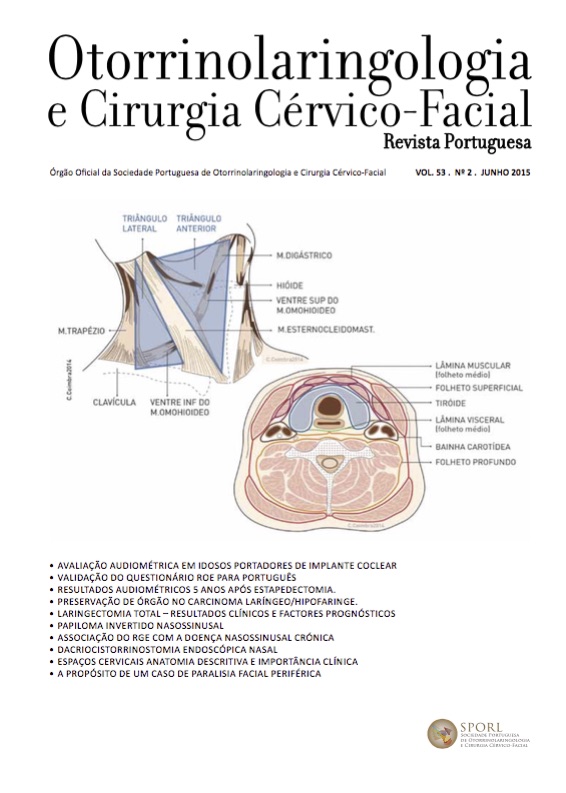Validation of rhinoplasty outcome evaluation (ROE) questionnaire to portuguese
DOI:
https://doi.org/10.34631/sporl.580Keywords:
questionnaire, rhinoplasty, ROEAbstract
Introduction: Facial plastic surgery and its results continue to be a challenge for both the patient and the surgeon. Rhinoplasty Outcome Evaluation (ROE) is a questionnaire covering the main aspects that influence the satisfaction of the patient undergoing rhinoplasty. The aim of this study was to perform the translation, cross-cultural adaptation and validation of Rhinoplasty Outcome Evaluation from English to Portuguese of Portugal.
Methods: Retrospective study involving 40 patients (22 women and 18 men) submitted to rhinoplasty and 30 volunteers (18 women and 12 men) without indication or desire of rhinoplasty or any other kind of nasal surgery.
Results: Mean 6 months postoperatively score was 19.63 in the group of patients and was 22.51 at the controls showing the validity of the questionnaire (p <0.05). We also tested the testretest reproducibility intra-interviewers with an interval of 96 hours (r = 0.81) and internal consistency was high (Cronbach α coefficient of 0.824). Like that resulted the final version of ROE, consisting of 6 questions that assess the main factors that influence the satisfaction of the patient undergoing rhinoplasty.
Conclusions: The Portuguese version of the ROE questionnaire is a valid instrument to assess patient’s outcomes following rhinoplasty surgery.
Downloads
References
Arima LM, Velasco LC, Tiago RSL. Crooked nose: outcome evaluations in rhinoplasty. Braz J Otorhinolaryngol. 2011;77(4):510-5.
Alsarraf R. Outcomes research in facial plastic surgery: a review and new directions. Aesthetic Plast Surg. 2000;24(3):192-7.
Guillemin F, Bombardier C, Beaton D. Cross-cultural adaptation of health-related quality of life measures: literature review and proposed guidelines. J Clin Epidemiol. 1993;46(12):1417-32.
Freiberg A, Giguère D, Ross DC, Taylor JR, Bell T, Kerluke LD. Are patients satisfied with results from residents performing aesthetic surgery? Plast Reconstr Surg. 1997;100(7):1824-31.
Hopkins C, Gillett S, Slack R, Lund VJ, Browne JP. Psychometric validity of the 22-item Sinonasal Outcome Test. Clin Otolaryngol. 2009;34(5):447-54.
Gillett S, Hopkins C, Slack R, Brown JP. A pilot study of the SNOT 22 score in adults with no sinonasal disease. Clin Otolaryngol. 2009;34(5):467-9.
Faidiga GB, Carenzi LR, Yassuda CC, Silveira F, Lago T, Leite MGJ, et al. Long-term evaluation in aesthetic rhinoplasty in an academic referral center. Braz J Otorhinolaryngol. 2010;76(4):437-41.






